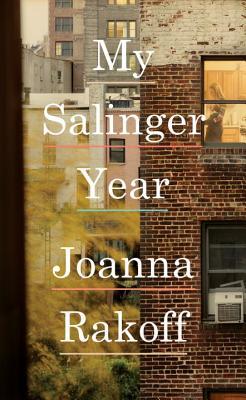The big picture of My Salinger Year is an enjoyable read: Fresh from dropping out of Grad School, Joanna Rakoff moves to NYC, falls in love with an older, Socialist wanna-be writer/amateur boxer ("like Mailer, only better"), and lands her first grownup job. Over the next year, Rakoff is forced to examine who she is and who she wants to be, and like all of us, makes that painful transition into adulthood. Because the year is 1996, Rakoff is also able to capture a time right on the cusp of going digital -- which was particularly momentous in the publishing industry where she worked -- and this lends her story a sheen of historical importance. All of this is good stuff.
But what annoyed me (and what might be of further historical interest to other readers) is how in the details Rakoff is a protohipster: carefully describing each vintage, thrift shop outfit (paired with the expensive Italian suede loafers her mother bought her); humblebragging about her Williamsburg apartment that had no heat or kitchen sink (but, hey, to live in this neighbourhood, who wouldn't wash dishes in the bathtub?); everyone she knows wear large, unflattering glasses and carry satchels full of notebooks and manuscripts; her boyfriend casually tosses a guayabera into a duffle bag (which I had to look up, because dumbo me, I didn't know what a Mexican four pocket wedding shirt was); and Rakoff writes about her poverty (which, with the surprise bills her Dad hands her, I don't doubt), but she constantly eats out and attends rooftop parties (where she and her friends ironically drink their parents' favourite cocktails) and keeps herself afloat in NYC. To further distance herself from the common experience, she writes:
Before I'd moved to New York, it seemed as though everyone was there, playing cockroaches in experimental plays, or making broody films at Colombia, or working at galleries, or teaching dance to the poor kids in Brownsville or to the rich kids at St. Ann's.Yeah, that's what everyone I know was doing. But Rakoff takes a job as an assistant to a literary agent -- and she refers to them throughout only as "my boss" at "the Agency", but apparently everyone knows it's Phyllis Westberg at Harold Ober Associates -- and Rakoff spends her days listening to a Dictaphone through oversize headphones and typing out letters on a huge, humming Selectric (and how hipster is that?) Fairly quickly, Rakoff learns that J. D. Salinger -- or Jerry as they call him -- is her boss' number one client, and to her alarm, she must speak to the near deaf author on the phone (which is pretty funny), and eventually, to send off form letters to people who send him fanmail (which is pretty touching since the form letter states that Mr. Salinger requests that nothing be sent on to him). This old fashioned agency, with its leather chairs and shaded lamps, is contrasted nicely with the fluorescent lights and white cubicles of the textbook publisher where Rakoff's friend works, and even though the friend calls the agency funereal, it's easy to see the appeal it had for Rakoff -- even the people are old-fashioned, with courtly manners and ivory cigarette holders.
And as interesting as the Agency was, here's my further complaint: Rakoff, from nearly the beginning, could apparently see where the Agency needed to get with the times. She also implies that despite her boss' legendary status in the publishing industry, if Rakoff had been in charge, they wouldn't have lost Judy Blume as a client. And, incredibly, although Rakoff was a poet and an English major, she had never read any Salinger and resisted doing so until she had been at the Agency for eight months. After bingeing on his complete works over a long weekend, she declares:
Salinger was not cutesy. His work was not nostalgic. These were not fairy tales about child geniuses traipsing the streets of Old New York.Something about this -- as though Rakoff had discovered Salinger on behalf of all of us -- just turned me off, and here's my biggest complaint of all: as someone who actually met Salinger, as someone who intimately knew how the man valued his privacy, there's a whiff of betrayal in her memoir. Rakoff recreated here some of the most emotional fan letters that passed through her hands, told of a Salinger book deal gone sour, even described that his flannel shirt and jeans both looked pressed, his hands warm and large -- I think that these are precisely the kind of details that Salinger became a recluse to avoid disclosing. This wouldn't be a best-seller without "Salinger" in the title (even though this book isn't really about him and has plenty of merit on its own) and that feels cheap to me. Even the treatment of her boss (and the revelation of her private affairs) had a gossipy The Devil Wears Prada vibe. The ending -- thirteen years after leaving the Agency, Rakoff learns of Salinger's death -- was redemptive, however, and I was invested enough in Rakoff to be glad to hear that her own story seems to have worked out okay.
Salinger was nothing like I'd thought. Nothing.
Salinger was brutal. Brutal and funny and precise. I loved him. I loved it all.
I've read The Catcher in the Rye twice and Franny and Zooey once, and because of The Storied Life of A. J. Fikrey, I recently read A Perfect Day for Bananafish. I should read more Salinger (and should keep in mind that Rakoff calls Raise High the Roof Beam, Carpenters one of the funniest books in the English language). It would be good to do some rereads in order to review the ones I've read already, but on the other hand, I'd hate to look like some kind of crumbum phony...

